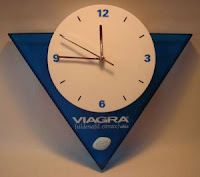El pichigüili ('tchotchkes') es una especie sumamente compleja que ha
demostrado establecer una fuerte relación de mutualismo con el profesional
sanitario (especialmente con el médico) al mismo tiempo que pone en peligro la
relación de simbiosis entre médicos y pacientes.
Concebidos en las madres empresas farmacéuticas, los pichigüilis son enviados desde muy pequeños a diferentes lugares a través de las cigüeñas representantes farmacéuticas. El pichigüili salvaje tiene como hábitat diferentes regiones de hospitales, centros de salud, congresos médicos y clínicas privadas donde se refugia con éxito. Desde las áridas llanuras del suelo, pasando por las altas cumbres de las paredes, las escarpadas batas de los médicos y las frondosas mesetas de los escritorios… Ninguna zona está libre de la increíble capacidad adaptativa del pichigüili para hacer de cualquier zona su hogar. Por otro lado, los pichigüilis domésticos poseen una situación privilegiada, reciben la atención y el cariño de su amo médico que lo lleva a su casa para que conviva con él.
Más
Ahora parece que llega su "agonía"...
Al menos en USA, por ahora...
For years, pharma helped keep the manufacturers of Lipitor pens, Prevacid golf club head covers, and other promotional items in business. But when the Pharmaceutical Research and Manufacturers of America imposed a voluntary ban in 2009 that relegated these and similar tchotchkes to the promotional netherworld of eBay auctions and displays in physicians' offices, nobody expected them to have much of a collectible afterlife.
The decision to enact the ban was a no-brainer. PhRMA was not alone in sensing a need to clean up the industry's image by addressing the ethics of providing an array of branded gifts to physicians.
Gimmicky marketing mementos like Post-it notes and pens may have seemed harmless enough, but the prescribing influence they carried came into question.
“These items were constantly in view and intended to keep specific drug names uppermost in physicians' subconscious. And it worked,” says Dr. Adriane Fugh-Berman, an associate professor in the departments of pharmacology and physiology and family medicine at the Georgetown University Medical Center. Fugh-Berman is also director of PharmedOut, a Georgetown research and education project that, per its website, “promotes rational prescribing and exposes the effect of pharmaceutical marketing on prescribing practices.”
These relics of the past have a certain value for those on the hunt. One eBay seller hopes to fetch $20 for a blue pill-shaped Viagra promotional clock that doubles as a business card holder, an item that was once a big weapon in the Pfizer sales rep's arsenal of freebies. And those golf club head covers — in the shape of a stomach, designed to somewhat subtly remind docs of Prevacid's utility in treating heartburn — still make occasional appearances on golf courses across the U.S. In fact, AbelsonTaylor president and CEO Dale Taylor recently spotted a set on a Chicago fairway — in mint condition, no less.
LOW-BROW HIGH JINKS?
According to several pundits, the PhRMA ban served to eradicate a source of obvious commercial bias just sitting there on doctors' desks.
“Many physicians thought the ban was silly, but that's because they were — and are — unaware of the effect of small gifts on creating a sense of obligation,” Fugh-Berman says. “There was also a certain amount of consternation among some docs, who couldn't figure out how to procure a pen that had not been provided by a pharmaceutical company.” (Más)
Ver todo sobre "pichigüilis" en PHARMACOSERÍAS














No hay comentarios:
Publicar un comentario